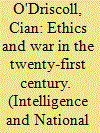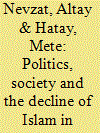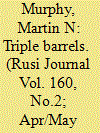|
|
|
Sort Order |
|
|
|
Items / Page
|
|
|
|
|
|
|
| Srl | Item |
| 1 |
ID:
140027


|
|
|
|
|
| Summary/Abstract |
This paper seeks to explore and explain the process through which Taiwan utilizes free trade – both at multilateral and bilateral levels – in enhancing its shrinking de facto sovereignty against the backdrop of ubiquitous ‘China factor’ in the twenty-first century. It argues that China's sinicization project creates a scenario wherein increasing cross-strait stability ironically leads to decreasing de facto sovereignty for Taiwan. Due to this existing cross-strait security dilemma, Taiwanese leaders are being forced to preserve the island's quasi-independent statehood due to fears of losing its remaining de facto autonomy over domestic and foreign affairs. In essence, Taiwan chooses to be de facto free by remaining de jure unfree. Taiwan's sovereign space, therefore, becomes a pivotal referent object of its national security policy and strategy. Balancing between the two paradoxical interests of enhancing sovereignty while maintaining the Chinese-dominated cross-strait status-quo underlines the relentless games, changes, and fears that Taiwan confronts today.
|
|
|
|
|
|
|
|
|
|
|
|
|
|
|
|
| 2 |
ID:
094458


|
|
|
|
|
| Publication |
2010.
|
| Summary/Abstract |
The discipline of International Relations has a patchy record when it comes to accounting for change in world politics. It has tended to focus on continuity instead. A typical statement in this regard is Martin Wight's depiction of international affairs as a 'realm of recurrence and repetition', while Hans Morgenthau has drawn attention to its 'repetitive character'.
|
|
|
|
|
|
|
|
|
|
|
|
|
|
|
|
| 3 |
ID:
087735


|
|
|
|
|
| Publication |
2009.
|
| Summary/Abstract |
Historical controversies continue to plague northeast Asian politics today, with Chinese and Koreans protesting Japanese history textbooks and Japanese politicians' visits to Yasukuni Shrine, and Koreans protesting Chinese claims that the ancient Kingdom of Goguryo was Chinese, not Korean. Yet, there is little empirical research exploring what, if any, impact historical beliefs have on threat perception and foreign policy preferences in northeast Asia today. On the basis of surveys of Chinese, Japanese, and South Korean university students, this paper explores the relationships among beliefs about the past, perceived threat in the present, and foreign policy preferences for the future. Results and their implications for northeast Asian security are discussed.
|
|
|
|
|
|
|
|
|
|
|
|
|
|
|
|
| 4 |
ID:
092498


|
|
|
|
|
| Publication |
2009.
|
| Summary/Abstract |
The definition of Turkish nationhood after the founding of the Republic has been evaluated and labelled very differently by various scholars. The classical view paralleled the official representation of Republican policies in describing Turkish nationhood as being based on a civic and territorial understanding of nationality. More recent and much more critical scholarship, which enjoys a near-hegemonic position in the study of Turkish nationalism today, claims that the official definition of Turkish nationhood has a clearly identifiable mono-ethnic orientation, manifest in a series of policies and institutions. This article argues that the definition of Turkish nationhood as manifest in state policies is neither territorial nor mono-ethnic, but rather ironically for the adamantly secular Turkish republic, the definition of Turkish nationhood is mono-religious and anti-ethnic, in striking continuity with the Islamic millet under the Ottoman Empire. The reason critical scholars perceive Turkish nationhood as mono-ethnic might stem from the dichotomous view of nationalisms as civic versus ethnic, a dichotomy that has recently been repudiated by some of its erstwhile proponents. Supremacy of the religious over ethnic categories in Turkey, as a historical legacy of the Ottoman millet system, might be applicable to most post-Ottoman states in the Islamic Middle East and North Africa, in contrast to the interplay of ethnicity and religion in Western Europe. This view of Turkish nationhood is confirmed by a dozen interviews that the author conducted with members of the political and intellectual elite of different ideological orientations in Turkey. It is then demonstrated how the new efforts at reformulating modern Turkish identity with reference to Ottoman and Islamic conceptions lead to new inclusion-exclusion dynamics with the Kurds and the Alevis, suggesting that a truly inclusive reformulation has to follow secular and territorial principles.
|
|
|
|
|
|
|
|
|
|
|
|
|
|
|
|
| 5 |
ID:
118866


|
|
|
| 6 |
ID:
137941


|
|
|
|
|
| Summary/Abstract |
With the economic rise of powers such as China that wish to reinterpret the global order underpinning trade and international law, there is renewed requirement for Western navies to think about how maritime power can contribute to the protection of commerce in the twenty-first century. In this article, Martin N Murphy explores the intersection that is now evident between economic, financial and maritime warfare, assessing how maritime power can once again be used in the exploitation of economic and financial weakness.
|
|
|
|
|
|
|
|
|
|
|
|
|
|
|
|
|
|
|
|
|